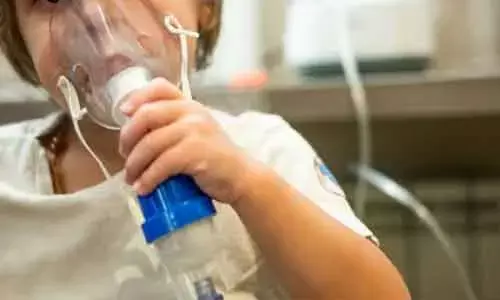- Home
- Medical news & Guidelines
- Anesthesiology
- Cardiology and CTVS
- Critical Care
- Dentistry
- Dermatology
- Diabetes and Endocrinology
- ENT
- Gastroenterology
- Medicine
- Nephrology
- Neurology
- Obstretics-Gynaecology
- Oncology
- Ophthalmology
- Orthopaedics
- Pediatrics-Neonatology
- Psychiatry
- Pulmonology
- Radiology
- Surgery
- Urology
- Laboratory Medicine
- Diet
- Nursing
- Paramedical
- Physiotherapy
- Health news
- Fact Check
- Bone Health Fact Check
- Brain Health Fact Check
- Cancer Related Fact Check
- Child Care Fact Check
- Dental and oral health fact check
- Diabetes and metabolic health fact check
- Diet and Nutrition Fact Check
- Eye and ENT Care Fact Check
- Fitness fact check
- Gut health fact check
- Heart health fact check
- Kidney health fact check
- Medical education fact check
- Men's health fact check
- Respiratory fact check
- Skin and hair care fact check
- Vaccine and Immunization fact check
- Women's health fact check
- AYUSH
- State News
- Andaman and Nicobar Islands
- Andhra Pradesh
- Arunachal Pradesh
- Assam
- Bihar
- Chandigarh
- Chattisgarh
- Dadra and Nagar Haveli
- Daman and Diu
- Delhi
- Goa
- Gujarat
- Haryana
- Himachal Pradesh
- Jammu & Kashmir
- Jharkhand
- Karnataka
- Kerala
- Ladakh
- Lakshadweep
- Madhya Pradesh
- Maharashtra
- Manipur
- Meghalaya
- Mizoram
- Nagaland
- Odisha
- Puducherry
- Punjab
- Rajasthan
- Sikkim
- Tamil Nadu
- Telangana
- Tripura
- Uttar Pradesh
- Uttrakhand
- West Bengal
- Medical Education
- Industry
Vitamin D deficiency linked with acute bronchiolitis in children: Study

Researchers from a recent study have found out that inadequate vitamin D status might serve as a risk factor for acute bronchiolitis in children.
The study is published in the BMC Pediatrics Journal.
Previous studies have suggested that cord 25(OH) vitamin D levels are significantly and inversely associated to the prevalence of respiratory infections and childhood wheezing.
Furthermore, vitamin D deficiency was found to be associated with acute bronchiolitis, poor asthma control, severe asthma exacerbations, and high consumption of asthma medications.
However, to understand the role of vitamin D in acute bronchiolitis further, researchers Inbal Golan-Tripto and colleagues from the Department of Pediatrics, Soroka University Medical Center, Israel Pediatric Pulmonary Unit, Soroka University Medical Center, Israel Clinical Research Center, Soroka University Medical Center, Beer Sheva, Israel Faculty of Health Sciences, Ben-Gurion University, Israel examined serum levels of 25(OH) vitamin D in infants younger than 24 months, that were clinically diagnosed with acute bronchiolitis.
The authors carried out a prospective cross-sectional case-control study which compared serum 25(OH) vitamin D levels between infants and toddlers diagnosed with acute bronchiolitis to subjects with non-respiratory febrile illness.
One hundred twenty-seven patients aged < 24 months were recruited; 80 diagnosed with acute bronchiolitis and 47 patients with non- respiratory febrile illnesses. Both groups had similar demographics aside from age (median [IQR] 5 [3–9] vs. 9 [5–16] months in the bronchiolitis group compared to control group (p = 0.002)).
Multivariate logistic regression, adjusted for age, sex, ethnicity and nutrition was performed. Correlation between serum vitamin D levels and bronchiolitis severity was assessed via Modified Tal Score and length of hospital stay (LOS).
The authors mentioned the following interesting findings-
a. Serum 25(OH) vitamin D levels were significantly lower in the bronchiolitis group; median [IQR] 28[18–52] vs. 50[25–79] nmol/L, respectively, (p = 0.005).
b. Deficient vitamin D levels (< 50 nmol/L) was found more frequently in the bronchiolitis group than controls; 73% vs. 51% (p = 0.028).
c. Multivariate logistic regression showed vitamin D deficiency was more probable in bronchiolitis patients; OR [95% CI] 3.139[1.369–7.195].
d. No correlation was found between serum vitamin D levels and bronchiolitis severity, which was assessed via Modified Tal Score and by length of hospital stay.
Therefore, the authors concluded that "Children with acute bronchiolitis displayed significantly lower vitamin D levels than children with non-respiratory acute febrile illnesses."
Dr. Nandita Mohan is a practicing pediatric dentist with more than 5 years of clinical work experience. Along with this, she is equally interested in keeping herself up to date about the latest developments in the field of medicine and dentistry which is the driving force for her to be in association with Medical Dialogues. She also has her name attached with many publications; both national and international. She has pursued her BDS from Rajiv Gandhi University of Health Sciences, Bangalore and later went to enter her dream specialty (MDS) in the Department of Pedodontics and Preventive Dentistry from Pt. B.D. Sharma University of Health Sciences. Through all the years of experience, her core interest in learning something new has never stopped. She can be contacted at editorial@medicaldialogues.in. Contact no. 011-43720751
Dr Kamal Kant Kohli-MBBS, DTCD- a chest specialist with more than 30 years of practice and a flair for writing clinical articles, Dr Kamal Kant Kohli joined Medical Dialogues as a Chief Editor of Medical News. Besides writing articles, as an editor, he proofreads and verifies all the medical content published on Medical Dialogues including those coming from journals, studies,medical conferences,guidelines etc. Email: drkohli@medicaldialogues.in. Contact no. 011-43720751


